
Bill giving protections to Uber drivers, others moves ahead
SACRAMENTO, Calif. — The California Assembly is expected to give final consideration Wednesday to a bill that would provide new wage and benefit protections to workers at so-called gig economy companies such as Uber and Lyft where people pick up jobs on their own schedule.
The state Senate passed the measure with a 29-11 vote late Tuesday over strident Republican opposition. Passage by the Assembly would send the bill to Democratic Gov. Gavin Newsom, who has said he supports it.
If signed, the proposal could have national implications as politicians and businesses confront the changing nature of work in the so-called gig economy.
In a rare injection of presidential politics into a state issue, most of the major Democratic presidential contenders urged California lawmakers to pass the bill and have championed similar proposals in their campaigns.
